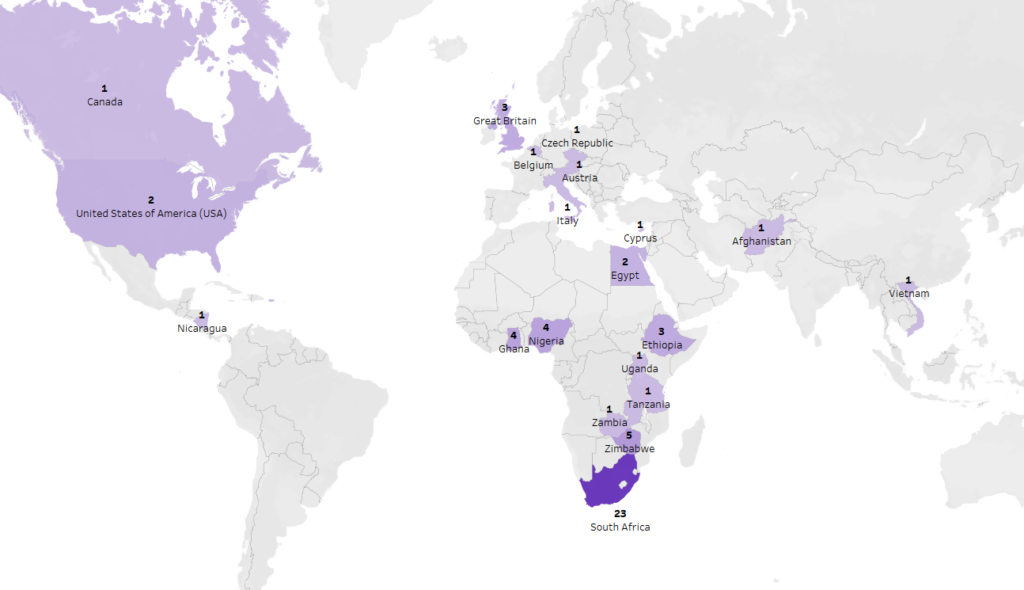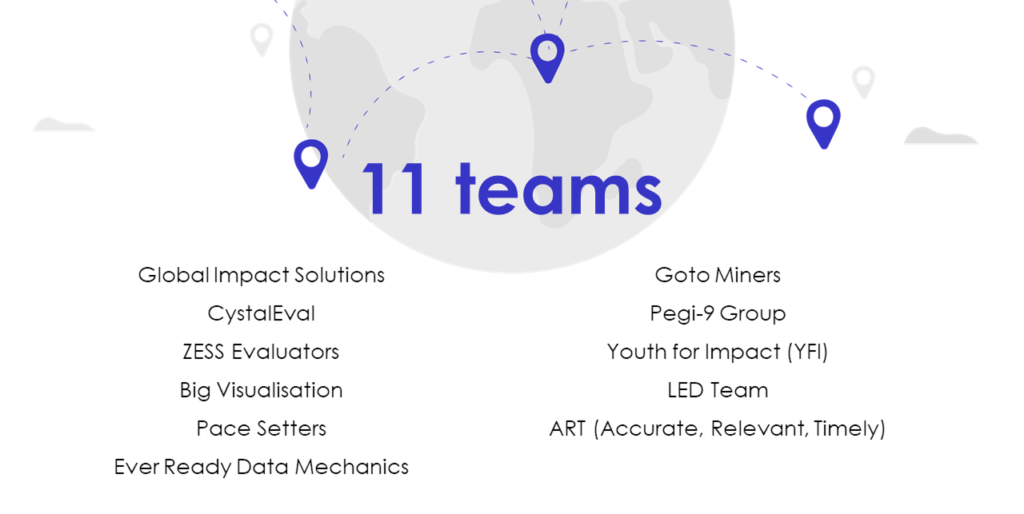We are now participating in a virtual world – one where we can easily feel lost in the sea of computer screens. Launching a Virtual Competition is a highly engaging way to stay connected, engage audiences globally, and in the world of evaluation: build capacity. In our latest blog, Khulisa sets out four clear steps for launching a Virtual #Evaluation Competition.
From Planning, Implementing, Hosting to Reflecting – here are an easy to follow how-to guide for launching your next virtual Competition.
Competition background
The gLOCAL Evaluation Week 2020 excitement ended on a high note with the hosting of the Khulisa Evaluation Design Competition for Young and Emerging Evaluators (YEEs) across the globe.
The competition hit two birds with one stone: it developed YEE’s evaluation capacity and inspired them to think out of the box, and supported a South Africa non-government organisation, PLAY Africa, with their evaluation needs.
We received 58 applications from 20 countries that were grouped together in eight teams.

For the competition, PLAY Africa made available their data and background information to the final teams. They could enter in one of the three categories:
- Category 1: A data mining/visualization exercise that uses existing data and is retrospective
- Category 2: A forward-looking approach that includes strategies for future data mining
- Category 3: A forward-looking approach that focusses on the development of an impact or quasi-experimental evaluation design
The applicants had to work in teams to submit their proposals for their preferred category. As part of the competition submissions, each team provided a summary of their approach, a 10-minute presentation and 10-minute response to judges’ questions.
STEP 1: Planning an #Eval Competition
The planning phase of any virtual competition is crucial, as it outlines how the processes will unfold. The pre-planning process allowed us to, collaboratively with Play Africa, develop the competition concept, aim and competition mechanics.
The following outlines the processes that preceded launching the competition.
| Process | Khulisa Notes |
|---|---|
| Identify theme and action for gLOCAL 2020 Evaluation Week | For any competition planning, it’s good to hook it to a specific event that will attract wider excitement and awareness |
| Brainstorm the format of the competition | Collaboratively share and discuss ideas from the team |
| Be clear what you want to achieve with the competition | In our case, it was partly a capacity building drive for a local NGO, PLAY Africa and we wanted to continue our support for Young and Emergent Evaluators (YEEd) |
| Engage other partners in the competition | Our involvement with PLAY Africa was a win-win because they made available their data to the applicants, while the competition also met their need for research design proposals in a creative way |
| Refine competition strategy and ideas, collaboratively | It was a team effort all along and suggestions from the team |
| Launch of the online competition application | We posted it on our website using Survey Monkey, and disseminated the details widely with the publishing of a pre-competition blog, the writing of a press release, and sharing on social media |
| Identify judges to represent the competition panel | We selected representatives from both Play Africa and Khulisa |
STEP 2: Implementing an #Eval Competition
The implementation process is the most exciting and certainly the most time-consuming part of planning a virtual Evaluation competition. Hence, there is need to be systematic and detailed in your approach. Pay attention to the following actions:
| Process | Khulisa Notes |
|---|---|
| Provide regular feedback/response to applicants | We also asked participants to give their teams a fun and catchy name |
| Allocate teams | We matched team members from different geographical locations |
| Ensure it all stays on track by providing support, feedback and encouragement to the teams | We emailed information regarding deadlines and requirements were clearly communicated to all teams |
| Request submission of assignments | We asked participants to submit video presentations one day before the actual competition, which we made available on YouTube. Some participants only sent PowerPoint presentations, which we then converted to video format in PowerPoint. |
| Assess assignments | Judges received all the presentations prior to competition day, and were able to begin the assessment process. |
Plan Competition Day logistics and set the Rules of Engagement
| Process | Khulisa Notes |
|---|---|
| Sequence the presentations against a set schedule/agenda to assessment rubrics | It is important to make sure that all scheduling is in line with the rubric format and agenda of the day |
| Allocate timing of Q&A sessions | When hosting a virtual competition, it’s useful to have a co-host to facilitate timing of sessions and manage the interaction with attendees |
| Prepare and line-up video presentations | Some were sent to us already in video format with voice-overs included, while for others we had to adjust the PPT files to videos). You can watch all eight video presentations here |
| Do a competition dry run | This allowed us to plan for eventuality and event flow – we even put down how long each video was (see Agenda in Annex A) |
| Hold Judges Briefing Session | Khulisa provided the technical inputs and PLAY Africa provided institutional knowledge and content. Each judge was able to ask one question to the team. |
| Send Judges’ questions to the teams | Judges used the rubrics to judge the videos and each judge came up with one question that the team would answer during the competition day |
| Consider audience participation | Since this could be a very passive exercise we set up Zoom polls for listeners to vote on the best team approach and to ask questions. |
| Winner announcement planning | In our case, winners were announced after all teams had the opportunity to showcase their presentations and answer questions from the judges |
STEP 3: Have fun – It’s Competition day!
The day of the virtual #Eval competition was exciting, as teams finally had the opportunity to perform and showcase their hard work and effort. On Competition Day, it was important to make sure of the following:
| Process | Khulisa Notes |
|---|---|
| Send all team participants the Webinar link | Double check and send it early in the morning, ahead of the allocated time |
| Ensure that all teams are aware of the schedule/agenda for the Webinar session | Teams were assigned to a specific time slot as per agenda, it was important to make sure they were all aware (see Annex A) |
| Outline the judging process clearly to both judges and participants | Check the schedule with the judges and highlight all the expected processes |
| Set up a private channel to communicate with Judges and the Competition MC | This enabled us to get through glitches like one team not pitching up to answer questions |
Altogether there were 11 teams who submitted their presentation:

Before the Webinar, three competition hashtags were developed and shared with participants:
#gLocalEval2020
#YEE
#EvaluationDesignCompetition
At least one of the hashtags should be unique for specific tracking – you can use tools such as MentionMapp to see how your hashtag performed.
These were again shared with participants during the Webinar for live tweeting. The Khulisa team also contributed to live coverage of the event on social media.
It was important for the event to be highly interactive and engaging therefore the co-host made sure that the chat line was open and encouraged participants to type away.
Zoom polls were administered during the webinar session and allowed all participants and attendees to provide their individual feedback on the presentations.
STEP 4: Reflect on the event
Now that the Competition was successfully implemented, it’s important to acknowledge the efforts of all the participants and teams for their commitment and hard work. Take note of the following important steps in the post-competition period:
| Process | Khulisa Notes |
|---|---|
| Administer a post-event survey | We wanted to follow our own practices and collect feedback from all the participants |
| Interview the competition partner to see if the competition succeeded in its goal | In our case, the interviews with PLAY Africa on the usefulness of the research designs and the process have led to new insights, which we will share in a follow-up blog |
| Reflection feedback | Include reflections from the judges and other stakeholders, as well as feedback on the final presentations and the lessons learnt in a learning brief or blog |
| Provide Certificates to all participants so that all the teams have a record of the event and their participation | We created three types of certificates: – Judges choice of winner and runner up – Listeners choice – Participation |
We will do two follow on blogs:
- Featuring the winners and advice for Play Africa
- Feedback we received!
Thanks so much for this write up! Delighted to share it!